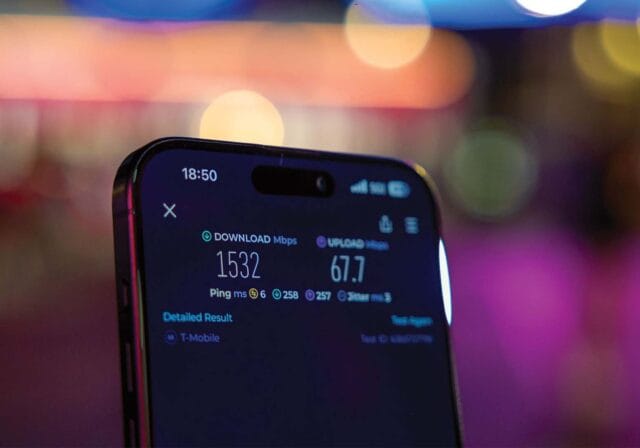In this guide, we’ll walk through why low-cost internet for seniors matters, the most common challenges seniors face when looking for a plan, as well as simple tips to help you (or someone you love) find a great deal and stay connected.
3 reasons why low-cost internet for seniors matters
For many older adults living on Social Security or fixed incomes, every dollar counts, especially when it comes to essential services like internet access. But affordable internet isn’t just about staying connected, it’s about staying independent and empowered.
With the right plan, seniors can:
- Stay close to loved ones with easy-to-use video calls.
- Manage appointments, prescriptions, and finances online.
- Explore hobbies, stream entertainment, and keep learning new things.
When internet costs are too high, seniors may miss out on these vital connections, leading to feelings of isolation or difficulty accessing everyday resources. Reliable, budget-friendly internet helps support independence, health, and quality of life - all from the comfort of home.
4 common challenges seniors face with internet providers
While affordable internet is more important than ever, finding a secure, budget-friendly plan isn’t always easy. Many traditional internet providers have plans with confusing terms, or complex wired setups that can make things more frustrating than helpful.
Here are some common hurdles and concerns:
- Surprise rate hikes: What starts as a low monthly price can quickly increase after a short-term promo ends.
- Long-term contracts: Some plans come with commitments and early cancellation fees that add financial stress.
- Tech headaches: Complicated installations, setup fees, or tricky equipment can feel overwhelming and expensive.
- Security, privacy, and identity theft: A recent poll found that 88% of people 55+ say the safety and privacy of their personal data is a concern when it comes to staying connected.
These obstacles can make it harder for seniors to access the benefits of reliable internet, from video calls to virtual healthcare. That’s why simple, affordable, secure, and transparent solutions matter more than ever.
Low-cost internet options: What seniors should look for
When it comes to choosing the right internet plan, simplicity and reliability should come first, especially for seniors who want to stay connected without added stress. The good news? There are affordable options out there that don’t require complicated set-ups or confusing contracts.
Here are 7 key features to look for:
- Straightforward pricing: No promotional pricing that changes automatically when the promotion expires.
- Hassle-free setup: Plans that offer easy self-installation or plug-and-play equipment, with no technician visits required.
- No equipment fees: Look for plans that include a modem/router or gateway at no extra cost.
- No long-term contracts: Choose flexible plans that let you cancel or change without penalties.
- Consistent, everyday speeds: Just enough bandwidth to stream, browse, or video chat with ease.
- Bundle options: Some providers offer discounts when you combine internet with phone service.
- High security standards: Choose a provider that is continually investing in and enhancing security measures that safeguard its technologies, processes, systems and teams.
Focusing on these essentials can make internet access easier to manage, both financially and day-to-day.
6 practical tips for finding low-cost internet
These 6 tips can help you find a reliable, low-cost, senior-friendly option, without the extra hassle or surprise fees:
- Shop around – Don’t settle for the first offer. Compare plans from multiple providers, and look for ones that offer options specifically for seniors.
- Ask about senior savings – Some providers offer discounts for customers 55 and older or AARP members, but you often have to ask.
- Skip the contract – Month-to-month plans provide more flexibility and less risk, especially if your needs change.
- Bundle to save – Combining internet with phone service can help reduce your monthly bill.
- Make sure the equipment is included – Avoid extra rental fees by choosing a plan that includes all the equipment at no additional cost.
- Read the fine print – Watch for promotional pricing that may increase over time, and be sure to understand the total long-term cost.
A little research can go a long way in finding an internet plan that’s both affordable and dependable.
8 frequently asked questions (FAQs) about low-cost internet for seniors
- Is there low-cost internet specifically for seniors on Social Security?
Yes, some low-income seniors living on Social Security - who meet certain criteria - may qualify for discounted internet and phone services through the Lifeline Support for Affordable Communications program, which is part of the Federal Communications Commission (FCC). Those who don’t meet that criteria can still take advantage of affordable internet bundles specifically for those ages 55 and older.
- How much does low-cost internet typically cost for seniors?
Senior-friendly internet plans can range in price, depending on the internet service provider (ISP). Contact your ISP to learn about current offers.
- What’s the best internet service for seniors on a budget?
It depends on your household size and needs. Generally speaking, look for services that feature simple setup, no annual contracts, and transparent pricing.
- Do seniors need to sign a long-term contract to get internet service?
No, many providers offer month-to-month internet for maximum flexibility.
- What should seniors prioritize when choosing an internet plan?
Prioritize affordability, clear pricing, included equipment, reliable speed, and ease of use for video calls, emails, and streaming.
- Can seniors set up home internet themselves?
Yes, look for ISPs that offer simple self-installation specifically designed for ease of use, eliminating the need for a technician visit.
- Does T-Mobile provide internet plans in rural locations?
Yes, T-Mobile’s fixed wireless technology offers reliable internet services to many rural and underserved areas.
- Is satellite internet a good choice for seniors?
Satellite internet may be a good choice in extremely remote areas, where few other options exist. However, it typically involves more complicated setups, making a fixed wireless solution a better choice for many seniors.
Ready to simplify your connectivity?
A reliable, low-cost internet plan can help boost quality of life and keep you connected, especially if you’re living on a fixed income or Social Security. Get T-Mobile 5G Home Internet - on America’s largest 5G network - for just $30/mo. per line with AutoPay, plus taxes and fees, when you bundle with any 55+ phone plan. Getting connected is a simple 15-minute setup, plus no monthly equipment fees or annual contracts. See if it’s available in your area now.
Visit our website for the latest offers on phones, devices, and accessories.
You may also be interested in:
- Our 10 Best Cell Phones for Seniors
- What’s a Dumb Phone and When is It a Smart Choice to Buy?
- What are the Best Fitness Trackers and Watches for You? Our Top 6 Picks
Sources:
https://pmc.ncbi.nlm.nih.gov/articles/PMC7737194
https://policybook.aarp.org/policy-book/utilities/telecommunications/high-speed-internet-services
https://www.fcc.gov/lifeline-consumers



